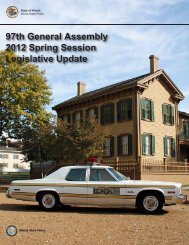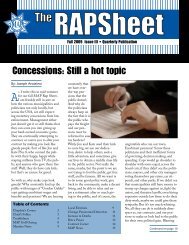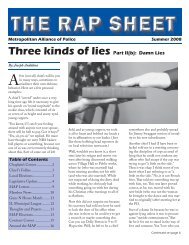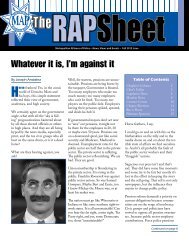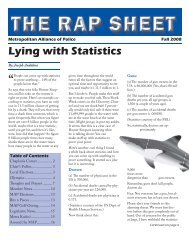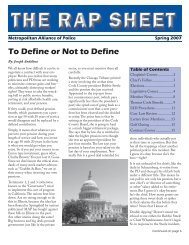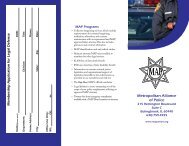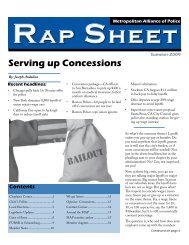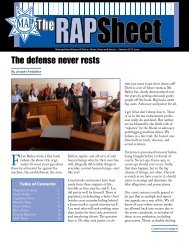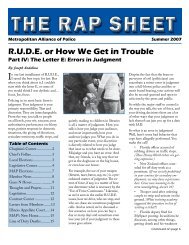R.U.D.E., or How We Get in Trouble - Metropolitan Alliance of Police
R.U.D.E., or How We Get in Trouble - Metropolitan Alliance of Police
R.U.D.E., or How We Get in Trouble - Metropolitan Alliance of Police
You also want an ePaper? Increase the reach of your titles
YUMPU automatically turns print PDFs into web optimized ePapers that Google loves.
Grievance Rights<br />
<strong>Police</strong> and Employer Responsibilities <strong>in</strong> Grievance Rights: Part I<br />
By Joseph M. Andal<strong>in</strong>a<br />
The collective barga<strong>in</strong><strong>in</strong>g rights<br />
granted to all police, c<strong>or</strong>rectional,<br />
and other law enf<strong>or</strong>cement related employees<br />
<strong>in</strong>cludes a duty <strong>of</strong> the employer<br />
to negotiate a grievance procedure to be<br />
<strong>in</strong>cluded <strong>in</strong>to a contract.<br />
This duty is mandated by the Ill<strong>in</strong>ois<br />
Lab<strong>or</strong> Relations Act, the National Lab<strong>or</strong><br />
Relations Board, and by the courts.<br />
After a barga<strong>in</strong><strong>in</strong>g unit is f<strong>or</strong>med at<br />
a state spons<strong>or</strong>ed election <strong>or</strong> maj<strong>or</strong>ity<br />
petition, the municipal, state, <strong>or</strong> county<br />
employer must barga<strong>in</strong> with the union<br />
to establish a grievance procedure as well<br />
as wages, benefits, and other issues both<br />
economic and non-economic.<br />
Once the grievance procedure is negotiated,<br />
agreed upon, <strong>or</strong> <strong>or</strong>dered <strong>in</strong> arbitration,<br />
the employer must abide by its provisions.<br />
If the employer refuses to do so,<br />
the union can f<strong>or</strong>ce compliance by fil<strong>in</strong>g<br />
unfair lab<strong>or</strong> practice charges <strong>or</strong> litigat<strong>in</strong>g<br />
the issue <strong>in</strong> court.<br />
An employer can sometimes raise challenges<br />
to grievances be<strong>in</strong>g brought<br />
f<strong>or</strong>ward by a union <strong>or</strong> member on the<br />
grounds <strong>of</strong> management rights. If this<br />
happens, an <strong>in</strong>dependent, unbiased arbitrat<strong>or</strong><br />
can be brought <strong>in</strong> to decide the issue<br />
<strong>or</strong> the courts may ultimately be given<br />
the case to decide. Usually the employer<br />
just denies the grievance at each step and<br />
the issue spirals upward through the steps<br />
until an arbitration date is filed, and the<br />
grievance itself is heard. The employer<br />
cannot just say no to a grievance and expect<br />
the issue to be dropped. Somewhere<br />
along the l<strong>in</strong>e, the grievance will be<br />
heard, either <strong>in</strong> court <strong>or</strong> at arbitration. Of<br />
course, the employer can also resolve the<br />
grievance by mak<strong>in</strong>g the grievant whole<br />
<strong>or</strong> <strong>in</strong> pla<strong>in</strong> terms, c<strong>or</strong>rect<strong>in</strong>g the issue at<br />
hand on behalf <strong>of</strong> the grievant. <strong>How</strong>ever,<br />
we all know how <strong>of</strong>ten that happens.<br />
The police union also has a responsibility<br />
to process grievances f<strong>or</strong> the employees <strong>in</strong><br />
any barga<strong>in</strong><strong>in</strong>g unit. The grievance must<br />
have a legitimate basis <strong>in</strong> the contract<br />
and the union must use reasonable care<br />
<strong>in</strong> process<strong>in</strong>g a member’s grievance. It<br />
is the grievant’s responsibility to follow<br />
the grievance steps, and that <strong>in</strong>cludes the<br />
meet and confer process with the employer.<br />
A union cannot be arbitrary <strong>or</strong> discrim<strong>in</strong>at<strong>or</strong>y<br />
<strong>in</strong> dropp<strong>in</strong>g a grievance. Rather,<br />
the dialogue <strong>in</strong> the steps from unit supervis<strong>or</strong><br />
to chief <strong>or</strong> city manager should<br />
be on-go<strong>in</strong>g <strong>in</strong> the hopes <strong>of</strong> obta<strong>in</strong><strong>in</strong>g a<br />
resolution to the matter.<br />
<strong>How</strong>ever a union has much m<strong>or</strong>e discretion<br />
<strong>in</strong> deny<strong>in</strong>g that a grievance can actually<br />
go f<strong>or</strong>ward past the grievance steps<br />
to actual arbitration. The union must act<br />
<strong>in</strong> “good faith” <strong>in</strong> decid<strong>in</strong>g whether <strong>or</strong> not<br />
to file f<strong>or</strong> an <strong>in</strong>dependent arbitrat<strong>or</strong> to<br />
ultimately hear the case if the unit steps<br />
are followed and no resolution <strong>in</strong> the<br />
procedure is f<strong>or</strong>thcom<strong>in</strong>g.<br />
A variety <strong>of</strong> fact<strong>or</strong>s may affect whether a<br />
full scale hear<strong>in</strong>g bef<strong>or</strong>e an arbitrat<strong>or</strong> occurs.<br />
What is the nature <strong>of</strong> the grievance<br />
itself Is the grievance an actual violation<br />
<strong>of</strong> the contract Or is it only closely<br />
related to a section Is there evidence<br />
to supp<strong>or</strong>t furtherance <strong>of</strong> the issue to<br />
arbitration Is there a likelihood <strong>of</strong> w<strong>in</strong>n<strong>in</strong>g,<br />
<strong>or</strong> has the case <strong>in</strong> other venues been<br />
litigated bef<strong>or</strong>e unsuccessfully Is there<br />
full cooperation from the grievant<br />
Other rationales may occur and as long<br />
as the union is diligent <strong>in</strong> its appraisal<br />
and aga<strong>in</strong>, acts <strong>in</strong> good faith, their decision<br />
to not go f<strong>or</strong>ward to arbitration is a<br />
legitimate cause f<strong>or</strong> denial.<br />
The employer, however, cannot make<br />
those decisions. Their veto <strong>of</strong> the grievance,<br />
their attempts to ign<strong>or</strong>e it <strong>or</strong> their<br />
refusal to accept a grievance <strong>in</strong> any stage<br />
is unacceptable.<br />
They must participate <strong>in</strong> every stage. If<br />
they refuse to do so, ign<strong>or</strong>e the grievant,<br />
<strong>or</strong> are unable <strong>or</strong> unwill<strong>in</strong>g to resolve the<br />
matter amicably with the union, then all<br />
th<strong>in</strong>gs be<strong>in</strong>g equal, an unresolved grievance<br />
should be sent through the steps acc<strong>or</strong>d<strong>in</strong>g<br />
to the contractual guidel<strong>in</strong>es and<br />
if necessary, scheduled f<strong>or</strong> arbitration.<br />
This may also <strong>in</strong>clude subjects such as<br />
discipl<strong>in</strong>e and term<strong>in</strong>ation <strong>of</strong> employment<br />
<strong>in</strong> those municipalities <strong>or</strong> MAP<br />
chapters if they are <strong>in</strong>cluded <strong>in</strong> a bona<br />
fide negotiated collective barga<strong>in</strong><strong>in</strong>g contract.<br />
The key here is that this provision<br />
must appear <strong>in</strong> a negotiated document.<br />
Sometimes promotions and department<br />
rules can also be grieved if agreed upon<br />
<strong>in</strong> any particular contract. N<strong>or</strong>mally,<br />
however, a grievance f<strong>or</strong>ms its basis when<br />
a violation <strong>of</strong> a contract occurs that affects<br />
an employee’s wages, benefits, <strong>or</strong><br />
other w<strong>or</strong>k<strong>in</strong>g conditions that are subject<br />
to collective barga<strong>in</strong><strong>in</strong>g.<br />
Page 12 The Rap Sheet W<strong>in</strong>ter 2006



